Brazilian Music Tidbits
- Bossa Nova -
Vinícius de Moraes - poet Extraordinaire
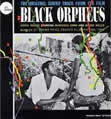 Antonio Carlos Jobim and João Gilberto were key artists in the bossa nova movement. Lesser known but equally important was Vinícius de Moraes, a Brazilian poet, lyricist, essayist and playwright who wrote the lyrics for many famous Brazilian songs. Garota de Ipanema, Insensatez and Chega de Saudade are some the bossa nova hits by the Jobim-Vinícius partnership. His play Orfeu da Conceição, a reworking of the story of Orpheus and Eurydice set in the carnival in Rio, was itself adapted into the film Black Orpheus, which won an Academy Award in 1959 as the Best Foreign Language film.
Antonio Carlos Jobim and João Gilberto were key artists in the bossa nova movement. Lesser known but equally important was Vinícius de Moraes, a Brazilian poet, lyricist, essayist and playwright who wrote the lyrics for many famous Brazilian songs. Garota de Ipanema, Insensatez and Chega de Saudade are some the bossa nova hits by the Jobim-Vinícius partnership. His play Orfeu da Conceição, a reworking of the story of Orpheus and Eurydice set in the carnival in Rio, was itself adapted into the film Black Orpheus, which won an Academy Award in 1959 as the Best Foreign Language film.
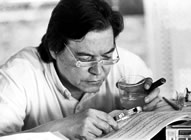 Antonio Carlos Jobim (better known as Tom Jobim) was a major composer (and one of my all-time favorite songwriters) who often collaborated with lyricist Vinícius de Moraes. Many of the bossa nova hits now considered jazz standards were written by Tom Jobim.
Antonio Carlos Jobim (better known as Tom Jobim) was a major composer (and one of my all-time favorite songwriters) who often collaborated with lyricist Vinícius de Moraes. Many of the bossa nova hits now considered jazz standards were written by Tom Jobim.
Jobim was an innovator in the use of sophisticated harmonic structures underlying an often simple yet catchy melody and is regarded as one of the most important songwriters of the 20th century.
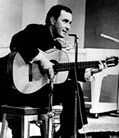 João Gilberto of course was the “inventor” of bossa nova. A lyrical fusion of samba and jazz - bossa nova uses the guitar as a percussive instrument to accentuate the samba rhythms. The singing style is done in a soft and vibrato-free voice.
João Gilberto of course was the “inventor” of bossa nova. A lyrical fusion of samba and jazz - bossa nova uses the guitar as a percussive instrument to accentuate the samba rhythms. The singing style is done in a soft and vibrato-free voice.
João Gilberto had quite a colorful (and eccentric) life. His biography is definitely worth reading:
Further Info:
Check out a few of other great bossa nova songwriters:
- Samba / Carnival -
Surdo, Batucada
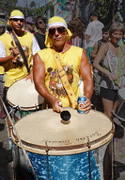 When Carnival comes around and thousand of drummers play and parade in sync in the Sambadrome, you can feel the earth shake! The surdo is the main culprit - it’s freaking deep and powerful. I played for a while in a Pagode band in NYC called “Pe De Boi” - translation: “Foot of the Bull” - a powerhouse rampage of drums - Grandma couldn’t sit still when the surdos started pounding!
When Carnival comes around and thousand of drummers play and parade in sync in the Sambadrome, you can feel the earth shake! The surdo is the main culprit - it’s freaking deep and powerful. I played for a while in a Pagode band in NYC called “Pe De Boi” - translation: “Foot of the Bull” - a powerhouse rampage of drums - Grandma couldn’t sit still when the surdos started pounding!
Further Info:
- Baião -
Yep - there is more to Brazilian music than just samba and bossa nova. The baião is from the northeast of Brazil and has a great groove.

Also Check Out
Medley: White Wing (A.K.A. Asa Branca); Black Wing — from the album Your Eyes You Can Fly - Flora Purim
- Tropicalismo -
Artists Rebellion
Musically (and artistically) mixing tradition with innovation, tropicalismo was characterized as a fusion of traditional Brazilian culture with foreign influences. Their mantra? “Cultural cannibalism that encouraged the conflation of disparate influences, out of which could be created something unique.” It’s an interesting story of artist rebellion (influenced by the Beatles!) that blossomed in the 60s. Great musicians such as Caetano Veloso and Gilberto Gil were hugely influential.
Further Info:
Gilberto Gil
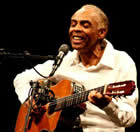 Gil began his career as a bossa nova musician, and then grew to write songs that reflected a focus on political awareness and social activism alongside artists such as longtime collaborator Caetano Veloso.
Gil began his career as a bossa nova musician, and then grew to write songs that reflected a focus on political awareness and social activism alongside artists such as longtime collaborator Caetano Veloso.
In February 1969, both Gil and Veloso were arrested by the Brazilian military government, and spent three months in prison and another four under house arrest, before being freed on the condition that they leave the country. Gil moved to London, but returned to Bahia in 1972 and continued his musical career, as well as working as a politician and environmental advocate.
Caetano Veloso
 Caetano Veloso has won nine Latin Grammy Awards and two Grammy Awards, more than any other Brazilian performer. The musical style of bossa nova was a major influence on Veloso's music as he grew up.
Caetano Veloso has won nine Latin Grammy Awards and two Grammy Awards, more than any other Brazilian performer. The musical style of bossa nova was a major influence on Veloso's music as he grew up.
Veloso's home, Bahia, has had a decisive role in his music. He praises Bahia for its importance in Brazil's colonial period—when the Portuguese first came—as well as for Bahia's contribution to Brazilian music. He has cited among his musical influences Amália Rodrigues, Cole Porter, the Rolling Stones 1969 tour, and above all, João Gilberto.
In the late 1960s, Caetano was one of the musical leaders in developing Tropicalismo, which fused Brazilian pop with rock and roll and avant-garde music. Veloso describes the movement as a wish to be different. Veloso's songs were frequently censored and some banned by the Brazil's military dictatorship which ruled until 1985. He spent a few years in exile in London but returned to Brazil in 1972. Caetano music is often characterized by frequent merging not only of international styles but of Brazilian folkloric styles and rhythms as well.
- Elis Regina, João Bosco, Ivan Lins -
Elis Regina
 Before her untimely death at the age of thirty-six, Elis Regina, was widely regarded as Brazil's greatest living popular vocalist. Her 1974 collaboration with Antonio Carlos Jobim, Elis & Tom, is often cited as one of the greatest bossa nova albums of all time, which also includes what many consider the all-time best Brazilian song, "Águas de Março". Elis Regina died at the age of 36 in 1982, from an accidental cocaine, alcohol, and drug interaction.
Before her untimely death at the age of thirty-six, Elis Regina, was widely regarded as Brazil's greatest living popular vocalist. Her 1974 collaboration with Antonio Carlos Jobim, Elis & Tom, is often cited as one of the greatest bossa nova albums of all time, which also includes what many consider the all-time best Brazilian song, "Águas de Março". Elis Regina died at the age of 36 in 1982, from an accidental cocaine, alcohol, and drug interaction.
João Bosco
 João Bosco is a noted Brazilian singer-songwriter with a distinctive style as a guitarist. H has been noted for "his singular fusion of Arab culture, Afro-American music and Brazilian styles bossa nova" (His father was Lebanese).
João Bosco is a noted Brazilian singer-songwriter with a distinctive style as a guitarist. H has been noted for "his singular fusion of Arab culture, Afro-American music and Brazilian styles bossa nova" (His father was Lebanese).
For most of his early career he supplied Elis Regina with some of her best material. Collaborating with lyricist Aldir Blanc, their work was witty, surreal, and extremely clever.
In 1977 Bosco wrote what was (and is) his most personal protest song, "O Bebaido e a Equilibrista" (The Drunkard and the Tightrope Walker), which became the theme song of Amnesty International.
Ivan Lins
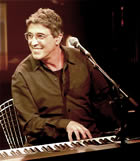 Ivan Lins is a Latin Grammy-winning Brazilian musician. He has been an active performer and songwriter of Brazilian music (and jazz for over 30 years. His first hit, "Madalena", was recorded by Elis Regina in 1970.
Ivan Lins is a Latin Grammy-winning Brazilian musician. He has been an active performer and songwriter of Brazilian music (and jazz for over 30 years. His first hit, "Madalena", was recorded by Elis Regina in 1970.
Lins' longtime composing partner is Vitor Martins. Their songs typically feature lush harmony with a distinctive jazz sensibility. He is a brillaint songwriter. I have recorded a snippet of one of his tunes: "Some People Just Never Learn" in Jukebones.